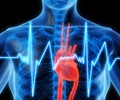
‘Exercise can be used as a stress test to detect heart disease. Walkers with excess troponin levels may be suffering from mild cardiovascular disease that has not yet been diagnosed.’
Read More..Tweet it Now
Research involving participants in a long-distance walking eventRead More..
To investigate the relevance of this increased troponin concentration after exercise, physiologists of the Radboud University Medical Center (Nijmegen, the Netherlands) and John Moores University (Liverpool, United Kingdom) took blood samples from 725 walkers before and after a bout of prolonged walking exercise and determined the troponin concentration. Subsequently, the research team contacted the walkers annually to determine their cardiovascular health and survival status.
Higher risk
"After ten years of research we can finally answer this important question," says researcher Thijs Eijsvogels. "Of the participants who had a high troponin concentration after walking, 27% developed severe cardiovascular disease or died during follow-up, while this was the case for only 7% in the group of participants with a low troponin concentration after walking. This study shows for the first time that an exercise-related increase in troponin is clinically relevant."
Stress test for the heart
Advertisement
Advertisement








